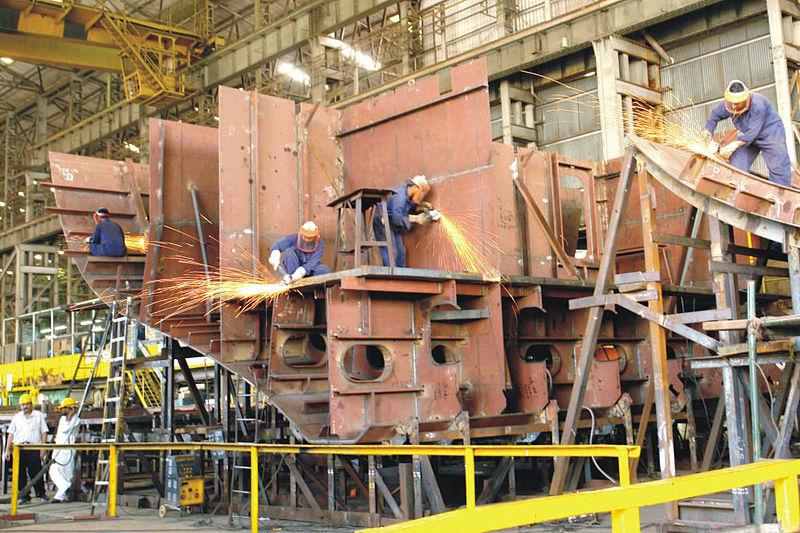 India Shipbuilding
India Shipbuilding
India calls on Japanese and South Korean ship manufacturers to participate in domestic shipbuilding’s ‘Maruti moment’
New Delhi/IBNS: India is actively seeking investments from South Korean and Japanese shipbuilders as part of its strategy to become a major global shipbuilding centre, according to a report by Mint.
An Indian delegation has engaged with South Korean authorities to gauge their interest in investing in India's proposed mega shipbuilding parks for constructing and repairing ships.
A similar initiative is planned for Japan to explore potential shipbuilding investments in India, as per reports.
“We are focusing on South Korea to establish shipbuilding infrastructure in India. The discussions are aimed at securing both funding and technology transfer. We are also undertaking similar talks with Japan,” T.K. Ramachandran, Secretary of the Ministry of Ports, Shipping, and Waterways, was quoted as saying by Mint.
Ramachandran said the ministry's goal is to elevate India's position from 22nd to among the top 10 global shipbuilding hubs by 2030, and to the top 5 by 2047.
“Three coastal states have already shown willingness to provide land for shipbuilding and repair clusters. We are now working to collaborate with companies to establish these clusters,” Ramachandran noted.
Pushpank Kaushik, CEO of Jassper Shipping, a Singapore-based shipping and logistics provider, emphasized that domestic shipbuilding is crucial for achieving the government’s goal of capturing at least 5 percent of global tonnage.
Currently, India holds less than 1 percent of global tonnage, which is insufficient for reaching the nation’s economic and developmental targets.
“Strengthening domestic shipbuilding will not only support Indian ship owners but also position India as an alternative to established shipbuilding countries like Vietnam, Korea, Japan, and China,” Kaushik told Mint.
India aims to replicate the success of the automotive sector’s growth, which began with the entry of Japanese carmaker Suzuki Motor Corp. in the 1980s, leading to the establishment of Maruti Suzuki India Ltd., T.K. Ramachandran said.
New Delhi plans to attract leading global shipbuilders such as South Korea’s Hanwha Ocean Co. Ltd. and Samsung Heavy Industries, as well as Japan’s Mitsubishi Shipbuilding Co. Ltd. and Mitsui Engineering and Shipbuilding, to invest in shipbuilding and repair infrastructure in India, as reported by Mint.
“These companies are potential candidates for setting up shipbuilding and repair facilities here,” the Secretary noted.
The Indian government is finalizing a comprehensive shipbuilding mission aimed at enhancing the country’s shipping infrastructure.
This includes developing a supportive ecosystem with favorable policies and incentives to boost ship manufacturing in India.
Under the Amrit Kaal Vision 2047 action plan, the government has identified 17 key initiatives to develop shipbuilding, repair, and recycling facilities in India, reports Mint.
Plans include extending shipbuilding policies beyond 2025-26, promoting self-reliance through the Atmanirbhar Bharat initiative, requiring only Indian-flagged vessels for government needs, grading shipyards by technical capability, and simplifying customs procedures for importing ship parts, according to the report.
Additionally, for ship recycling, the government aims to expand the Alang Shipyard, utilize the vehicle scrapping policy, and develop new recycling locations in Andhra Pradesh, Odisha, and West Bengal to serve global markets, the Mint report added.
According to the Amrit Kaal Vision 2047 plan, India needs a robust shipbuilding ecosystem with the right infrastructure and policy support to become a leader in the shipbuilding, repair, and recycling sectors.
Global shipbuilding is valued at approximately $70 billion, with China, South Korea, and Japan dominating the market, as noted in the Indian shipping ministry’s Maritime Vision 2030 document.
The global ship repair market is estimated to be around $12 billion, as per reports.
In the early 2000s, India’s shipbuilding industry, which produced vessels exceeding 300,000 gross tons, was among the world’s top 10.
However, the global downturn severely affected Indian shipyards, reducing India’s market share to under 1 percent, Mint reported.
India currently operates 28 shipyards—six under central public sector entities, two under state governments, and 20 by private companies.
The country is a major player in ship recycling, holding a 25 percent share of the global market, though it faces increasing competition from countries like Bangladesh and Pakistan due to better yields and regulatory advantages.
Shipyards in China, Singapore, Bahrain, Dubai, and West Asia dominate the global ship repair market, benefiting from advanced technology and skilled labor, which attracts business from lower-cost locations such as Malaysia, Indonesia, and India, according to the Mint report.
Support Our Journalism
We cannot do without you.. your contribution supports unbiased journalism
IBNS is not driven by any ism- not wokeism, not racism, not skewed secularism, not hyper right-wing or left liberal ideals, nor by any hardline religious beliefs or hyper nationalism. We want to serve you good old objective news, as they are. We do not judge or preach. We let people decide for themselves. We only try to present factual and well-sourced news.






